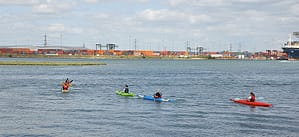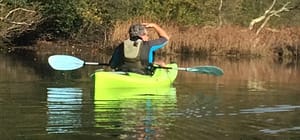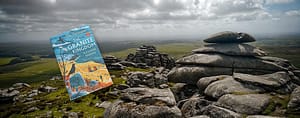Kayaking in the UK
At the time of writing kayaking is one of those exercises now permitted during lockdown. I have kayaked in various places around the world but currently travel beyond the shores of the UK is either banned or inadvisable. It is likely to remain so for sometime and even when we can travel consumer confidence will be low.
The fact that we do not want to travel or are not allowed to is a chance to explore our own country. There are some great places to kayak on our rivers and canals, on our lakes and along our long and varied coastline.
When not kayaking in far-flung destinations much of my kayaking is done on the rivers flowing into Southampton Water and along the coastline of the Solent. I have written posts on these in the past (see below)

Kayaking close to home
I have paddled in a kayak among the islands of a Baltic archipelago off the coast of Sweden; along the Ardeche Gorge

Kayaking the Hamble
To catch the tides it meant an early start; well early for an autumnal Sunday morning. The Hamble is a tidal river
There are, of course, a great deal more places to kayak than my home waters of Hampshire and the Isle of Wight. There follows a selection of areas to paddle in.
Before taking to the water check what conditions need to be watched out for; paddle within your abilities and paddle with someone; find out what form of permission/licensing you need (almost all inland waterways will require a license).

Jurassic Coast, Dorset
The Jurassic Coast of Dorset, famous not only for its fossils but also fabulous rock formations and picturesque coastline, has so much that is best seen from sea-level in a kayak. Lulworth Cove is a great place to put a kayak in and explore the coast in either direction. The highlight for me is the great arch of Durdle Door a short paddle west of Lulworth Cove.

South Cornwall
I have chosen to divide Cornwall into south and north.
The south coast, although it has some dramatic coastline is also indented with several multi-branching river estuaries. One of the best to explore by kayak is the River Fal. Truro is at one end and Falmouth at the other end where the river meets the sea. There are plenty of inlets and tributaries to explore in a kayak. St Mawes on the Percuil River and Devoran on Restronguet Creek are two points of entry and great bases to explore from. The whole system of waterways making up the Fal Estaury are tidal.

North Cornwall
The north Cornish coast is a far more rugged and dramatic coastline. St. Ives and nearby Godrevy Lighthouse are worth exploring but with an eye on wind and tides. The coast from Portreath to Porthtown, Chapel Porth and St Agnes makes for a good days kayaking but again, care needs to be taken with the tides. Each of the places mentioned are all beaches manned by lifeguards and ideal for a break. There are a number of caves that can be explored by kayak at high tide
Pembrokeshire
Starting at Milford Haven the Atlantic Ocean with the help of numerous rivers has carved its way deep inland. These tidal waterways and creeks are ideal for exploring by kayak. Much of this area is included in the Pembrokeshire Coast National Park and as such the scenery is mainly pastoral with woodland. Cresswell Quay, a quaint picturesque harbour, is a good place to start. Check the tide times and you can paddle gently down stream to Lawrence Quay, exploring the many inlets on the way. If you keep note of the tide times you can have a tide assisted return to Cresswell Quay. This makes for a very pleasant day’s paddling.
Llangollen Canal
Continuing the pastoral theme but inland rather than on tidal waterways kayak the Llangollen Canal in North Wales It will take you over the wooded Dee Valley on the UNESCO World Heritage listed Pontcysyllte Viaduct. Made of cast iron on stone arches it is the longest and highest structure of its kind in the UK. The view from the viaduct looks out across an Area of Outstanding Natural Beauty (AONB). The canal then continues through wooded and pastoral Welsh and then English countryside

The Lake District
To paddle on lakes amid some of the best mountain scenery head for Cumbria and the Lake District. Although the scenery is mountainous the best way to explore is paddling on the many lakes. There is the wild, rugged and mysterious Wast Water with a real sense of remoteness. Derwent Water is better known for a gentler kind of scenery and diverse wildlife including the red squirrels which inspired Beatrice Potter to write The Tale of Squirrel Nutkin. If kayaking in the spring paddle the length of Ullswater where William Wordsworth saw “…a host of golden daffodils,” and was inspired to write “I wander’d lonely as a cloud…”.

Scotland
Kayaking in Scotland merits a post of its own, indeed places to kayak would fill a complete book. The Outer Hebrides provide some wonderful sea kayaking as does much of the indented, island strewn western coast. Choose the sheltered sea lochs of Argyll or the swirling seas of Arran, Skye or Jura depending on your skills and mood.

On the mainland there are more lochs than you can count that provide routes for kayaking. You can take a multi-day kayak along the Great Glen from Fort William to Inverness or a day trip around the likes of Loch Tay with its mountain backdrop.

For the really adventurous kayaker there is a 500km sea kayak trail up the west coast of Scotland. Beginning off the Mull of Kintyre it heads north through the myriad isles of the west coast to Ullapool. The scenery is spectacular, the seas challenging and the wildlife – seals, dolphins, otters and eagles – abundant.
Northumberland
One of the highlights of kayaking off the Northumberland coast is the Farne Islands. This group of rocky outcrops is world famous for its sea birds with thousands nesting on the islands. Visitors to the islands are advised to wear hats and this advice should be taken note of by kayakers too. Stray too close to the nesting terns and you are likely to be aggressively dive-bombed. At the right time of year there are puffins to be seen as well as a 6000 strong colony of grey seals that delight in following kayaks.
It was on these Islands that the Forfarshire foundered in a storm. It was because of the bravery of the lighthouse keepers daughter that five souls were rescued that night. The girls name was Grace Darling.

Norfolk and the Broads
Norfolk is not a place that immediately springs to mind as a destination for kayaking but it has a strong nautical history. North Norfolk around the shelter waters and tidal marshes of Scolt Head Island where were Admiral Horatio Nelson and future captain of the Cutty Sark Captain Richard Woodget both grew up and learned to sail. It is a great place for kayakers of all abilities to explore.
No inclusion of Norfolk is complete without mentioning The Broads. These man-made waterways are a result of peat cutting during medieval times. There is a maze of channels, ponds and broads to explore with a vast array of wildlife just waiting to be spotted.
The Thames and London

Kayaking the Thames in London can be full-on urban kayaking at its finest but there are some hidden gems if you know where to go. Paddling the Thames between Kingston and Richmond where kings and queens retreated from the hurly burly of the city in times past takes you past royal parks and well heeled towns.
Kayaking Regent’s Canal gives a varied view of London. From the markets in Camden to Regents Park you paddle through the London Zoological Gardens past the gardens of Ambassador’s residences. Alternatively start from Paddington Basin through little Venice and explore the up and coming buzzing communities alongside the canal towards Kensal. Being London there are plenty of waterside places to eat and drink. This was after all a working canal and the boatmen need pubs and taverns to keep them refreshed and fed.

Something for all paddling ability
Wherever you are in the country there is somewhere you can get on the water and go kayaking. There are plenty more places that have not been mentioned; these are just a few of the highlights.
Remember though to keep safe by paddling only within your ability, wear a life jacket at all times and check what licence you need. If kayaking at sea or in tidal waters check local tide times and ask the locals where any dangers, including unseen currents are.
Where do you like to kayak? Is there somewhere not mentioned above that should be included. Let us know in the comments below.
Useful links
Almost all non-tidal inland waterways require a licence for you to kayak, British Canoe Union as teamed up with navigation authorities for a single waterways licence that covers 4500km of canals and rivers in England and Wales.
Scotland is a special case when it comes to access. More details can be found on the Scottish Canoe Association website.
Check locally for any permissions not covered above especially if you are using harbours or marinas
Canal and River Trust for information on our waterways





